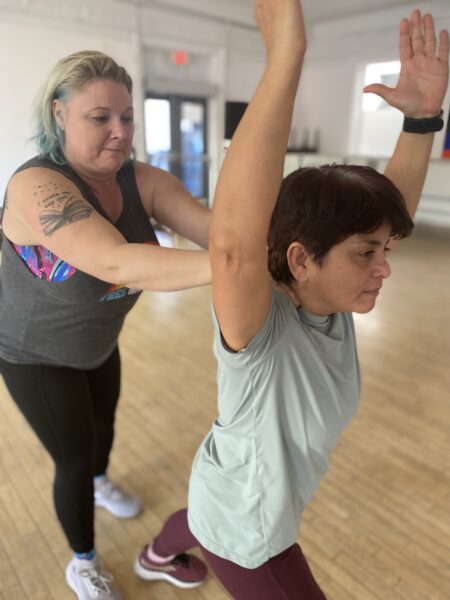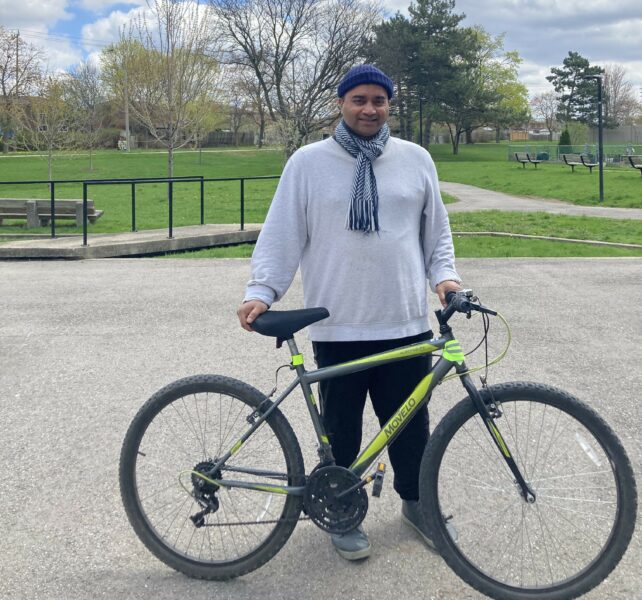Homes First is putting overdose prevention at the forefront.
Blog by Brett Wolfson-Stofko, Manager of Harm Reduction at Homes First
We are proud to partner with Parkdale-Queen West Community Health Centre, The Neighbourhood Group (TNG), The Works, South Riverdale Community Health Centre, Street Health, and Sherbourne Health to provide embedded harm reduction supports within our shelters, shelter-hotels, and supportive housing sites. Learn more about the Mobile Shelter Support Program which helps to support and train our staff and residents in overdose prevention.
International Overdose Awareness Day takes place annually on August 31 when we remember and honour those lost to overdose. However, it is not solely a day of mourning but also a day of action. Homes First and its harm reduction partners will be holding memorials as well as overdose response training for residents and staff throughout the week to do our part at reducing the death toll. Overdose deaths have skyrocketed since the COVID pandemic but ours and others commitment to implementing harm reduction strategies are helping prevent further overdose deaths.
How Homes First practices harm reduction
We have trained all our frontline staff on how to use the opioid overdose reversal drug naloxone as well as pulse-oximeters to monitor residents’ blood-oxygen levels and heart rate. Additionally, all our frontline supervisors and managers are further trained on the administration of oxygen in response to overdoses. This internal harm reduction capacity building is essential for us to provide the highest quality of care and support for our residents.
Furthermore, we are collaborating with The Works (Toronto Public Health) to operate a supervised consumption site (SCS) at our Lake Shore Blvd site which supervises 10-15 injections per day and can respond immediately to any potential overdose. Importantly, every injection that occurs at the SCS is an injection that did not occur in a washroom or out in the community. Many of our residents who use opioids are also receiving a safer opioid supply (SOS) from our partners at Parkdale-Queen West Community Health Centre, South Riverdale Community Health Centre, and The Works.
Safer opioid supply programs provide pharmaceutical-grade opioids to people who already use opioids, so they do not have to use the unpredictable, illicit opioid supply. Research on SOS suggests that these programs not only reduce overdoses but improve people’s access to primary care and mental health supports while decreasing their reliance on petty crime to fund their substance which is a win for us all. These collaborations and programs put us at the forefront of harm reduction within the shelter and housing sector.







International Overdose Awareness Day.
Reducing stigma
Despite all of these advancements, there is still a general misconception about harm reduction and its effectiveness. Some media and politicians have attempted to anecdotally link harm reduction programs with community violence in an effort to discredit these strategies. The scapegoating of harm reduction programs for broader societal ills that elected leaders refuse to address—such as a lack of public investment in housing, healthcare, mental health, etc.—is nothing new.
Harm reduction saves lives
The evidence is clear: harm reduction saves lives! There is nearly 40 years of evidence from multiple countries demonstrating the effectiveness of these strategies. Importantly, research shows that harm reduction programs do not increase violence, do not increase youth drug use, and do not increase community drug use in the neighborhoods in which they operate. In fact, harm reduction programs provide huge benefits to people who use drugs, their families, and the broader community by reducing public drug use, the occurrences of overdose, overdose deaths, and the transmission of HIV and HCV.
On this day, let’s remember those we’ve lost and work to build a more supportive and compassionate society that cares for the needs of all.
How you can help
It’s really quick and easy to learn how to use Naloxone. I always equate it to keeping naloxone in your home like a fire extinguisher.

Click here for a list of participating pharmacies in Toronto (you do not require a health care card.)


